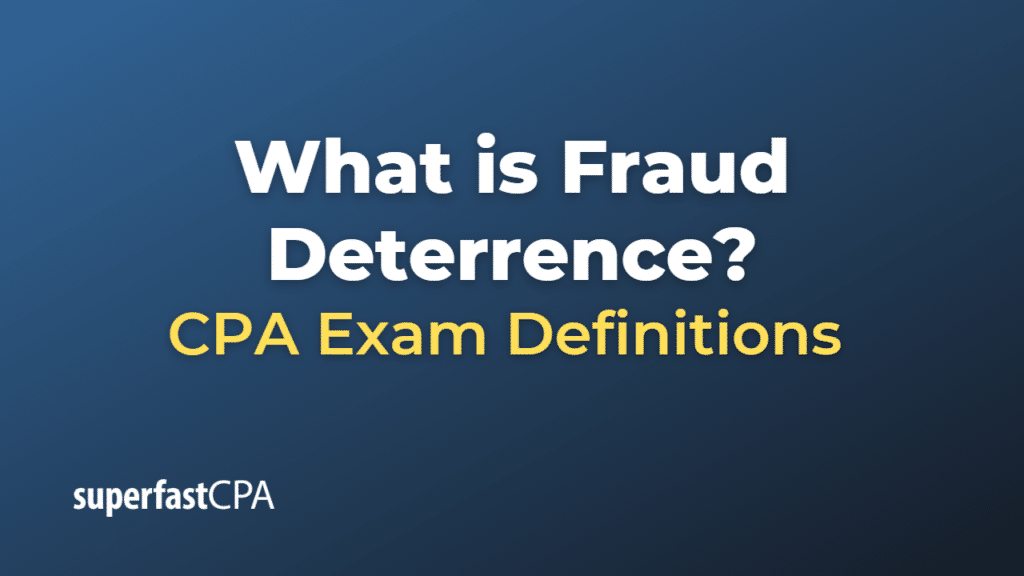Fraud Deterrence
Fraud deterrence involves proactively identifying and removing the potential causes and opportunities for fraud in an organization. The goal of fraud deterrence is not only to prevent fraud from occurring but also to discourage individuals within an organization from even attempting to commit fraudulent acts.
Fraud deterrence is typically a part of a larger risk management strategy within a company. It is based on the idea that by making fraud more difficult to commit, less rewarding, and more likely to be detected, individuals will be less likely to engage in fraudulent behavior.
Elements of a fraud deterrence strategy may include:
- Establishing a Strong Ethical Culture: An organization that emphasizes honesty, integrity, and ethical behavior can help deter individuals from committing fraud. This can include a strong ethics policy, ethics training, and a leadership team that sets a good example.
- Implementing Internal Controls: Strong internal controls, such as segregation of duties (different people are responsible for different parts of a process), mandatory vacations (someone else has to do a person’s job while they’re out, possibly revealing irregularities), and regular audits can make it more difficult for individuals to commit fraud.
- Regularly Monitoring and Auditing: Regular monitoring of financial transactions and periodic audits can increase the likelihood that fraud will be detected, thus acting as a deterrent.
- Establishing Reporting Mechanisms: Having clear procedures for reporting suspected fraudulent activity, including anonymous reporting options, can deter fraud. Employees are more likely to report suspicious activities if they know how to do so and feel safe in doing it.
- Enforcing Consequences: If fraud is detected, enforcing consequences – such as disciplinary action, termination, or legal action – can serve as a deterrent to other individuals.
- Risk Assessment: Regularly conducting fraud risk assessments can help identify vulnerabilities and take corrective action before fraud occurs.
Fraud deterrence measures can be highly effective in minimizing the risk of fraud within an organization, but they cannot entirely eliminate the possibility of fraud. Therefore, companies should also have measures in place to detect and respond to fraud promptly when it does occur.
Example of Fraud Deterrence
Let’s consider a hypothetical example involving a large manufacturing company that we’ll call “ManuCo.”
ManuCo has several manufacturing plants and thousands of employees. The management team of ManuCo wants to proactively deter fraud within their organization. Here’s how they might implement a strategy for fraud deterrence:
- Strong Ethical Culture: The management team begins by establishing a clear code of ethics that outlines acceptable and unacceptable behavior. This code of ethics is communicated to all employees, and every employee is required to attend ethics training annually. The management team consistently emphasizes the importance of ethics and integrity in all business activities.
- Internal Controls: ManuCo segregates duties within its financial department. For example, the person who authorizes payments is not the same person who reconciles the bank statements. They also implement a policy that requires mandatory vacations for employees in key financial roles. These measures make it more difficult for any single employee to commit fraud.
- Regular Monitoring and Auditing: The company has an internal audit department that conducts regular audits of various areas of the company’s operations. They also use data analysis software to monitor financial transactions and identify any unusual or suspicious patterns that could indicate fraud.
- Reporting Mechanisms: ManuCo establishes a confidential hotline that employees can use to report any suspicious activity without fear of retaliation. They communicate the existence and purpose of this hotline to all employees.
- Enforcing Consequences: The company clearly communicates that any fraudulent behavior will result in severe consequences, including termination and potential legal action.
- Risk Assessment: ManuCo conducts regular fraud risk assessments, identifying areas of potential vulnerability and taking action to address these risks.
Over time, these measures help to create an environment where fraud is less likely to occur. Employees know that unethical behavior is not tolerated, they understand the high likelihood of getting caught due to strong internal controls and regular monitoring, and they know that they can safely report any concerns. As a result, potential fraudsters are deterred from committing fraudulent acts.













